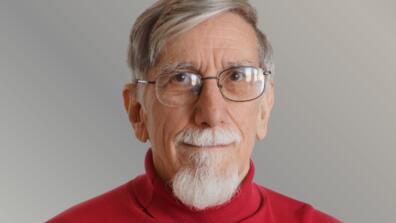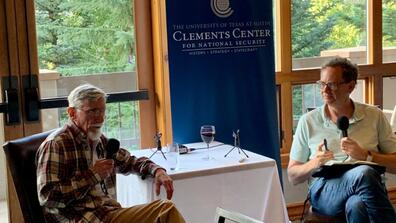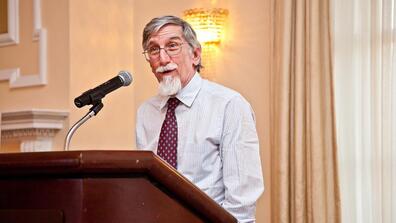Reflections on the Legacy of Robert Jervis
Professor Robert Jervis’s colleagues reflect on his legacy in a video shown at A Conference on Today’s Competitive Geopolitical Landscape - in honor of Robert Jervis on February 17, 2023.
Jervis, a giant in the field of international relations who taught at SIPA and Columbia for more than four decades, died in December 2021.
Transcript
KAREN YARHI-MILO: Bob Jervis was one of the most incredible legends in the field of international relations. He was a true intellectual. He was a scholar. He was a mentor to so many of us in our community of political science.
RICHARD K. BETTS: Bob Jervis was a leading scholar of international politics, having written seminal works on psychology and international relations.
PAGE FORTNA: When I think about what I knew about Bob Jervis before I came to Columbia — I'd read lots of his work. I think anybody studying international relations had read lots of his work and. He was known for his work on the security dilemma, known for his work on systems effects.
JACK LEWIS SNYDER: Bob was a really good teacher in his quirky way. He made people think. He did not just impart the bottom-line answer.
RICHARD K. BETTS: Beyond his substantive, intellectual contributions, he was a leader in the management of the profession as the president of the American Political Science Association.
PETER CLEMENT: I first came to meet and better understand Bob Jervis during my time at CIA. He was highly respected among my peers and colleagues, so much so that his books are used as textbooks in our new analytic training courses.
INGRID GERSTMANN: Bob was really inclusive. He wasn't impressed by rank, really. He was more impressed by people's minds. And so anybody could come to lunch with him or talk to him in his office.
JACK LEWIS SNYDER: The highest praise that you can give somebody in academics is that they created a field that then thrived as a research agenda for later generations of scholars. And Bob essentially did that.
PAGE FORTNA: He also has had a huge impact on people who've gone into the policy world. And I always got the sense that he felt that was an important contribution and one he took a lot of pride in.
RICHARD K. BETTS: Bob was the consummate academic intellectual in the sense that roughly our hobby is our work.
PETER CLEMENT: I would say to myself, I want to be Bob Jervis when I grow up. Of course, I'm kind of old already, but you do realize, he's indefatigable. I used to call him, both at the agency and when I got here, I'd say, Bob is like the Energizer bunny. He gets up fairly early. He walks quite a distance to the university. And he would come in and he'd immediately engage people.
KAREN YARHI-MILO: He had a great sense of humor. And every email that you would get from him had a line or two that would make you smile, if not laugh, no matter how serious the email was or the topic.
PAGE FORTNA: The Bob Jervis method of getting his thoughts out into publication was unique. He would use a Dictaphone, old-fashioned, little, black, old-school Dictaphone. And he would dictate his thoughts. And then he would hand the tapes to a work-study student in the Saltzman Institute who would type them up.
INGRID GERSTMANN: In the whole time I knew him, he never let me refurbish, remodel, clean, move his office. And it was erratic. So his desk was at an odd angle, but that was to fit more rows of books underneath.
JACK LEWIS SNYDER: Surrounding Bob as he was sitting there in his chair on both sides, were like literally thousands of books on political science, international politics, military history.
INGRID GERSTMANN: He also had figured out for himself what was important and what wasn't. Clothing was not important. He would just get up and put on the same clothes. And, of course, that saved a lot of time. It's called the capsule wardrobe.
KAREN YARHI-MILO: Bob's wardrobe —OK, very simple — khakis, if it's the summer, polo shirt. If it's winter, turtleneck. And he had the polo shirts in all colors. But he really liked four in particular.
PAGE FORTNA: He walked to campus every single day that he came to campus, which was every day. And his barometer for crime levels in the city was how often he got mugged. And in his very Bob way he said, I knew I was getting old when somebody who mugged me called me sir-- sir, can I have your wallet. He was more worried about being called "sir" and being perceived as old than he was about getting mugged, just very Bob.
KAREN YARHI-MILO: What he cared deeply about is creating a community, a community of scholars that were engaged in both the political science department and SIPA. And so one of the things that he used to do, is he used to gather us for the Jervis lunch.
PETER CLEMENT: Bob would literally knock on the doors of the faculty and say, we're all going to meet for lunch. And we'd have an informal, sometimes 10, 15 people conversation about current events or some interesting articles someone had read.
JACK LEWIS SNYDER: He helped to establish a norm in the department of openness to different ideas and debating every issue.
INGRID GERSTMANN: I remember it being remarked on by visiting scholars. The most unique thing about us was our open doors and our open exchange. That was something that you didn't see all the time. And Bob was really instrumental in making that a reality.
PAGE FORTNA: The work he put into building community within the department, within the Saltzman Institute, for him, the joy was all about bringing people together and talking about stuff and laughing about stuff.
PETER CLEMENT: His willingness to give time — Bob was willing to share the time and meet with students and talk about their thesis or some project they were working on. And he would always find time to do that.
KAREN YARHI-MILO: Bob inspired me to want to be a political scientist. And then he gave me the best advice and guidance and mentorship.
JACK LEWIS SNYDER: When Bob imparted to me his wisdoms and strategies, it was really like every stage of my career, Bob was their, shining light on the path ahead of me.
RICHARD K. BETTS: He was a leader of the profession outside of Columbia. So it was how much he did, in addition to the scholarly achievements that made his academic reputation.
PAGE FORTNA: I think a lot of people in the department and the Saltzman Institute are thinking about how much he did to make this place a great place to work and a great place to think and produce scholarship. And so much of that was about the ways in which he brought people together. And so we're trying to keep that going.
INGRID GERSTMANN: He exemplified what happens if you're lucky enough in this world to figure out what you love and what you're good at, and you get to do it all the way up until the very end.
KAREN YARHI-MILO: He was just so fascinated by everything around us. He saw everything is an opportunity to really explore and ask questions and challenge the conventional wisdom.
JACK LEWIS SNYDER: He was someone whose brilliance was something that he used as a tool to make his communities and his personal relationships better.
RICHARD K. BETTS: The leaders in many lines of work are extraordinary people who manage to do a number or a quality of things that's unusual. There will be a few others who will be as impressive as Bob, just not very many.
[MUSIC PLAYING]


